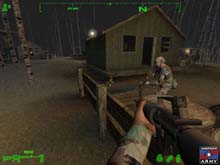
NEW YORK (CNN/Money) - While most folks like to make resolutions as the New Year approaches, I'm the type who likes to look back and see if I can learn any lessons from the previous 12 months.
Promises for the future are too easily forgotten. Of course, in some cases, so are historical lessons. But if I can walk away from a year having learned a few things that will influence my thinking in the future, then I feel I've managed to improve myself. This is even truer in the business world – especially in a field that's growing as fast as the gaming industry.
Lesson One: Innovative thinking brings huge rewards.
Rockstar Games might have found itself in the center of a media storm due to the graphic violence of its Grand Theft Auto games (which, technically, came out in 2001, but bloomed in 2002), but the company also may have revolutionized the gaming industry in the process. Instead of forcing players to follow a linear, pre-set path, the games let you do what you want, when you want it. It's that same formula that has helped "The Sims" become the best selling game of all time. For Rockstar's parent company Take Two Interactive (TTWO: Research, Estimates), it meant sales of $218.3 million in the fourth quarter.
 |
|
| "America's Army" was a hit with potential recruits and critics. |
Other developers are taking note. Expect to see a lot more "sandbox" style games in the future.
The U.S. Army, meanwhile, took a leap of faith in building "America's Army" – a free, commercial-quality action game that also served as a recruiting tool. The game not only looked good, it was a heck of a lot of fun. Was it a successful recruitment tool? There are no hard numbers to say either way. But the game definitely turned plenty of heads. Since its July 4 release, "America's Army" has been downloaded more than 5 million times and currently has 1.1 million registered users.
Lesson Two: It's important to stand up for yourself.
The argument over gaming violence isn't going to end anytime soon. And typically, the industry is willing to at least debate the issue with whoever raises it. It only did so halfheartedly in May, however – and paid the consequences when Senior U.S. District Judge Stephen Limbaugh ruled that violent or sexually explicit video games are not constitutionally protected forms of speech. That was followed almost immediately by a bill in the U.S. House of Representatives that proposed making it a federal crime to sell or rent violent video games to anyone under 18.
The case is currently under appeal by the Interactive Digital Software Association and awaiting a hearing date (which won't happen before February). Several organizations – including the International Game Developers Association and the Free Expression Policy Project (a New York-based think tank) – have filed friends of the court briefs supporting the gaming industry.
The House bill died in the subcommittee on crime, terrorism and homeland security this year, but it's coming back. A spokesperson for Rep. Joe Baca (D-Calif.) says the bill will be reintroduced next year and "actively pursued."
 |
|
| Despite the controversy and hype, "BMX XXX" was a dog at retail. |
Lesson Three: Sex doesn't always sell.
Remember in September, when the most controversial video game headed to store shelves was "BMX XXX"? Chock full of topless bikers and DVD quality footage of real strippers, it touched off a firestorm of controversy. "60 Minutes," in fact, featured it in a story earlier this month.
Here's what you're not hearing: The game flopped. NPDFunworld reports that the PlayStation 2, Xbox and GameCube versions of the game – combined – have only sold about 32,000 copies. It's usually here that I mention NPD numbers don't include the United States' largest game retailer, Wal-Mart (WMT: Research, Estimates). In this case, it doesn't matter, though, since Wal-Mart refused to carry this game.
"BMX XXX" may have put Acclaim Entertainment's (AKLM: Research, Estimates) name in the news, but it hasn't helped the company's struggling bottom line.
Lesson Four: Greed may, in fact, be good.

| |
|
Click Lara for previous columns
|
|
Publishers decided to test new price limits for the PC this year – and I'm willing to bet they were happy with what they saw.
Infogrames (IFGM: Research, Estimates) started the trend, putting a $55 price tag on "Neverwinter Nights" ($5 more than the traditional ceiling). Gamers complained loudly about the prices – but still bought the games. NPD reports "Neverwinter Nights" sold 330,000 copies (earning $18 million). "Warcraft III" sold more than 740,000 domestically. (Again, these numbers don't include Wal-Mart.)
Consumers, though, might want to boost their gaming budgets, as it looks like higher prices are going to become more common.
There's obviously plenty to learn from 2002. The question is: Who's paying attention?

Morris, whose abdominizer sits unused in a closet, is Director of Content Development for CNN/Money. Click here to send him an e-mail.
|

